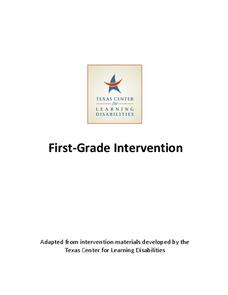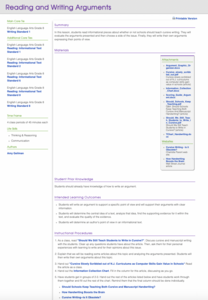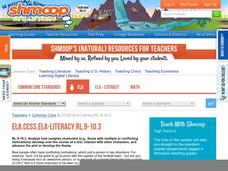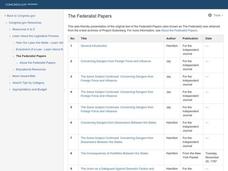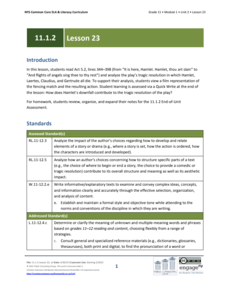EngageNY
Revisiting Big Metaphors and Themes: Revising and Beginning to Perform Two-Voice Poems
Now that your class has read all of Esperanza Rising, take the time to tackle big metaphors and themes. Pupils will participate in an activity called Chalk Talk, in which they circulate around the room in small groups and add comments to...
Shmoop
ELA.CCSS.ELA-Literacy.RL.11-12.3
Identifying an author’s choice, especially choices that concern craft and literary devices, is a difficult skill to teach. Here's an activity that will make your job easier. The resource breaks down how to teach the skill to novice,...
Texas Center for Learning Disabilities
First-Grade Intervention
Learning how to read is a big challenge for young learners, but this series of lessons provides them with the extra support they need to succeed. With each lesson following the a clearly outlined format, children are introduced to new...
Curated OER
Prepositions
Elementary schoolers view and study ten pictures of the location of a ball adjacent to a box. They decide where the ball is and match it to its appropriate preposition on the right. A good language arts lesson!
Curated OER
Children of War
Take a closer look at the impact of war in this language arts and social studies lesson. Middle schoolers use primary sources to conduct research as they relate to the effects of war on children. They compare and contrast the effects of...
Curated OER
Poetry Through Digital Storytelling
Bring digital storytelling to your language arts class! To begin, learners select their own topic, such as a poem that reflects a life experience they had or a historical figure who interests them. Then they work to create a storyboard...
Curated OER
Red is the Word!
Through the use of stories, artwork, and the KidPix program, youngsters explore the color word red, and engage in activities around the word. Teaching kindergartners about the color words can be so much fun. This could be adapted for any...
Curated OER
The Noble Eightfold Path
Students gain an introduction to Buddhist teachings about moral behavior by exploring a depiction of the Buddha and by writing a speech inspired by their interpretation of the Noble Eightfold Path.
Internet Archive
Daz 4 Zoe
It is rough trying to make your way through Romeo and Juliet with young readers. The language can set up barriers that prevent conversations about the conflicts and themes. Robert Swindells Daz 4 Zoe is similar in structure and theme,...
Curated OER
Statements and Questions
Teach your class the differences between statements and questions with a simple activity. After reading four statements, third graders rewrite the sentences as questions. They do the opposite in the last section. A helpful activity for...
Curated OER
Reading and Writing Arguments
Should schools continue to teach cursive writing? After reading and considering the merits of a series of arguments on both sides of this proposition, class members choose a side of the issue and craft their own argument, drawing support...
Japan Society
Akutagawa Ryunosuke and the Taisho Modernists
Japan's Taisho Period was a time when authors like Akutagawa and other Japanese modernists began to experiment with point of view and literary form, making the literature produced during this time period a natural choice for teaching...
Shmoop
ELA.CCSS.ELA-Literacy.RL.9-10.3
Focus on complex characters with a lesson from a series that teaches individual skills from the Common Core. Specifically, this resource provides practice with standard RL.9-10.3. Get pupils thinking and talking about characters with the...
Shmoop
ELA.CCSS.ELA-Literacy.SL.11-12.2
One way to get your class to evaluate and synthesize multiple multimedia sources is through a research project. The idea here is that class members will watch videos and listen to scientific debates in order to create a casebook about...
Dorling Kindersley
Question Words
Teaching your primary learners how to ask questions? Then look no further. This worksheet introduces the six essential question words: who, what, where, when, why, and how. Children begin by practicing how to write these words, before...
Curated OER
Parts of a Friendly Letter
The art of writing a letter has not been lost to email and texting! Teach kids how to format a friendly letter with a presentation about the parts of a letter, as well as prompting them to write a letter about their favorite holiday.
Houghton Mifflin Harcourt
Around Town: Neighborhood and Community: Extra Support Lessons (Theme 3)
Neighborhood and community is the theme of a unit comprised of extra support lessons. Following practice pages and a teach, blend, guided practice, practice/apply routine, the series of lessons provide additional reinforcement of reading...
EngageNY
Grade 10 ELA Module 4: Unit 2, Lesson 6
What decisions might an author make about the structure of a play? Pupils participate in an evidence-based discussion about Shakespeare's choices in Macbeth. Next, scholars analyze the effect of Shakespeare's structural choices in Act 2,...
EngageNY
Grade 11 ELA Module 1: Unit 2, Lesson 2
What tools did Shakespeare use to develop his characters in the play Hamlet? With the resource, pupils engage in a discussion about how the character Claudius introduces and develops Hamlet. They explain how word choices in Claudius's...
EngageNY
Grade 11 ELA Module 1: Unit 2, Lesson 23
All's well that ends does not apply to Shakespeare's Hamlet. Scholars read Act 5.2 using the resource, discovering the play's tragic resolution. Pupils complete a Quick Write analyzing how Hamlet's downfall contributes to the play's...
EngageNY
Grade 11 ELA Module 1: Unit 2, Lesson 7
Following a ghost's advice may not be in anyone's best interest, but that doesn't stop Hamlet! Using an exciting resource, pupils continue reading Act 1 of Shakespeare's Hamlet, in which the ghost tries to convince Hamlet to seek revenge...
EngageNY
Grade 11 ELA Module 2: Unit 2, Lesson 2
How did Elizabeth Cady Stanton advocate for women's rights? Pupils consider this question as they continue reading "An Address by Elizabeth Cady Stanton." They complete a Quick Write, analyzing how satire and sarcasm advance the author's...
EngageNY
Analyzing the Significance of the Novel’s Title: Connecting the Universal Refugee Experience to Inside Out and Back Again, Part 2
How does poetry help people better understand societal issues? Pupils participate in a jigsaw activity to analyze poems from the novel Inside Out & Back Again. Next, they connect the poems to real-life refugee experiences from the...
EngageNY
Close Reading: Paragraph 4 of “Refugee and Immigrant Children: A Comparison”
Why is reading a text closely a helpful skill? Using the 13th of 20 lessons from the Grade 8 ELA Module 1, Unit 2 series, scholars continue reading the informational text "Refugee and Immigrant Children: A Comparison." They work with...




